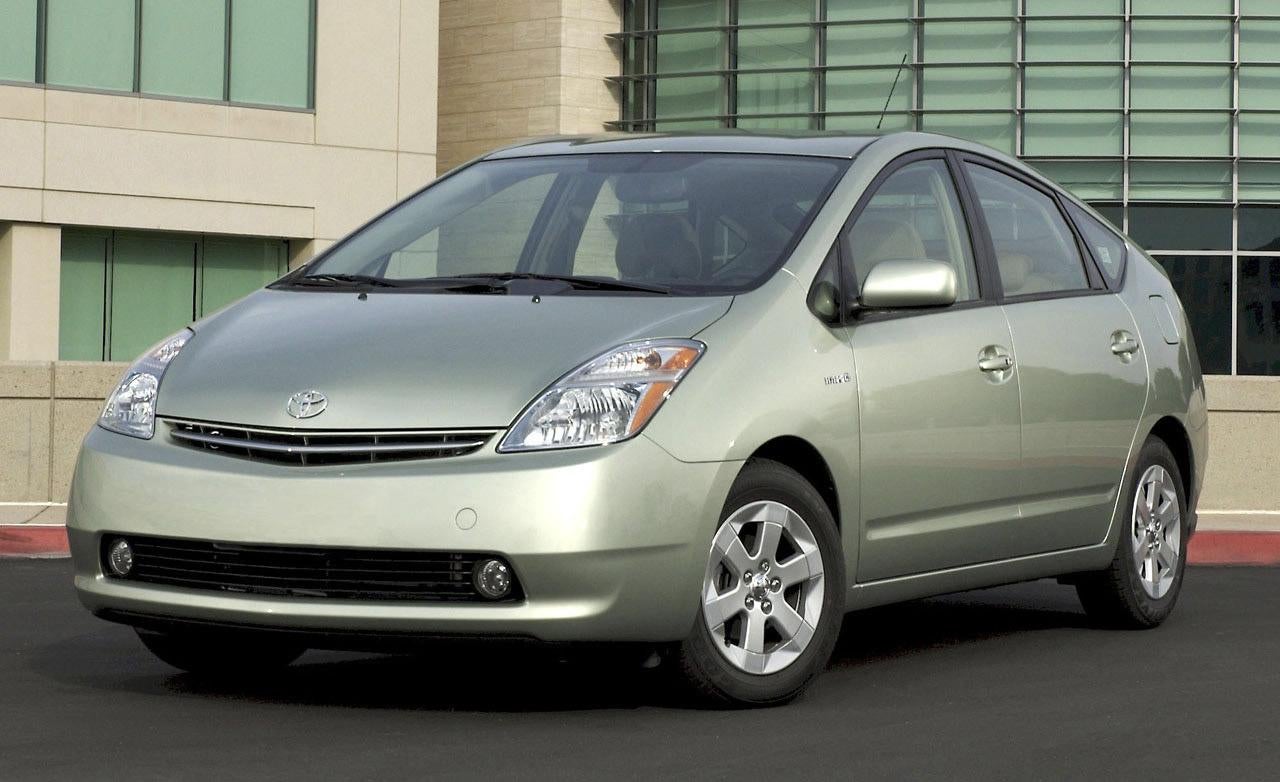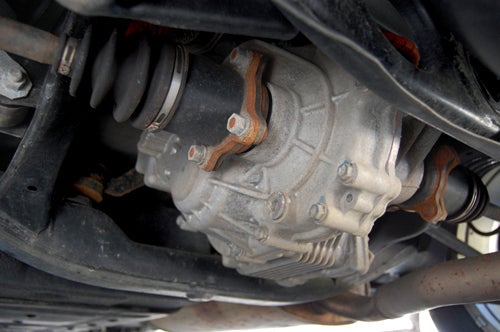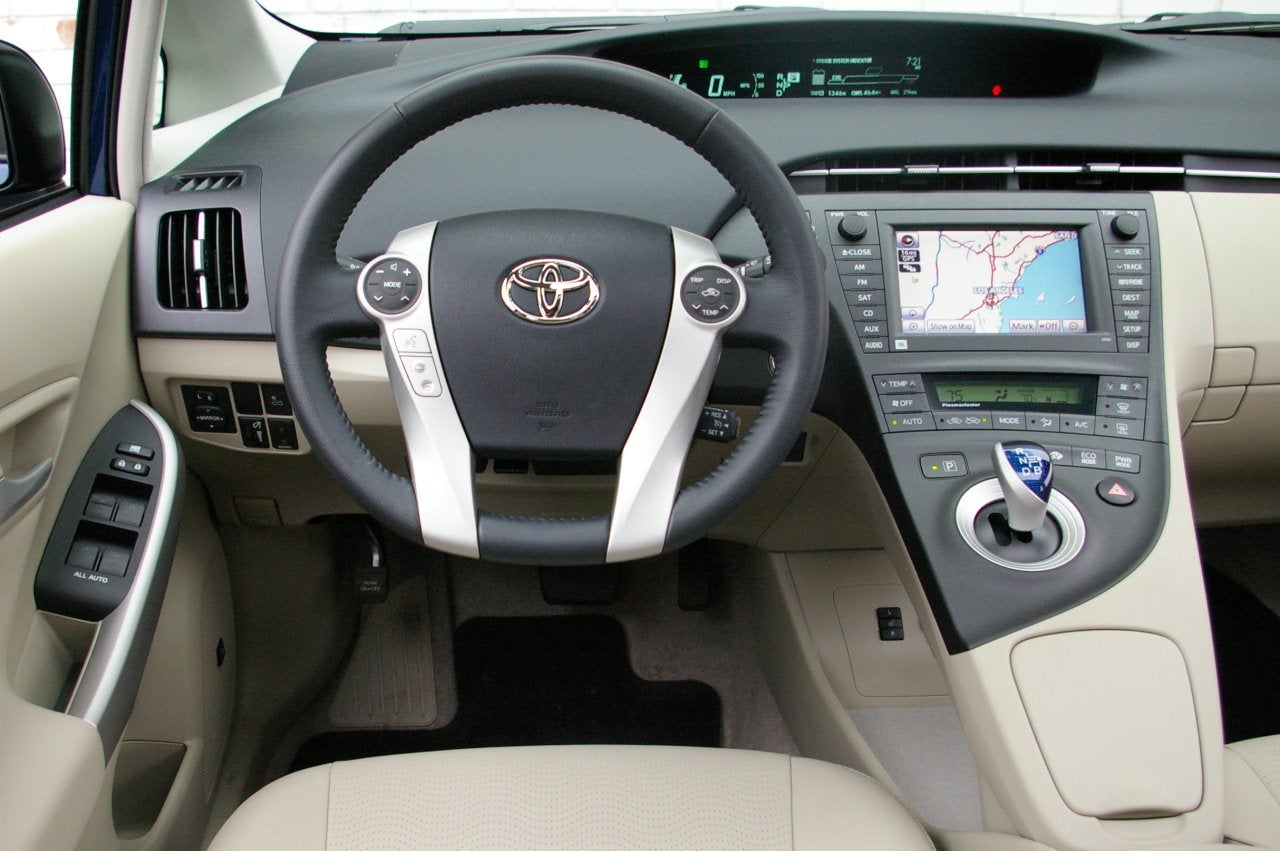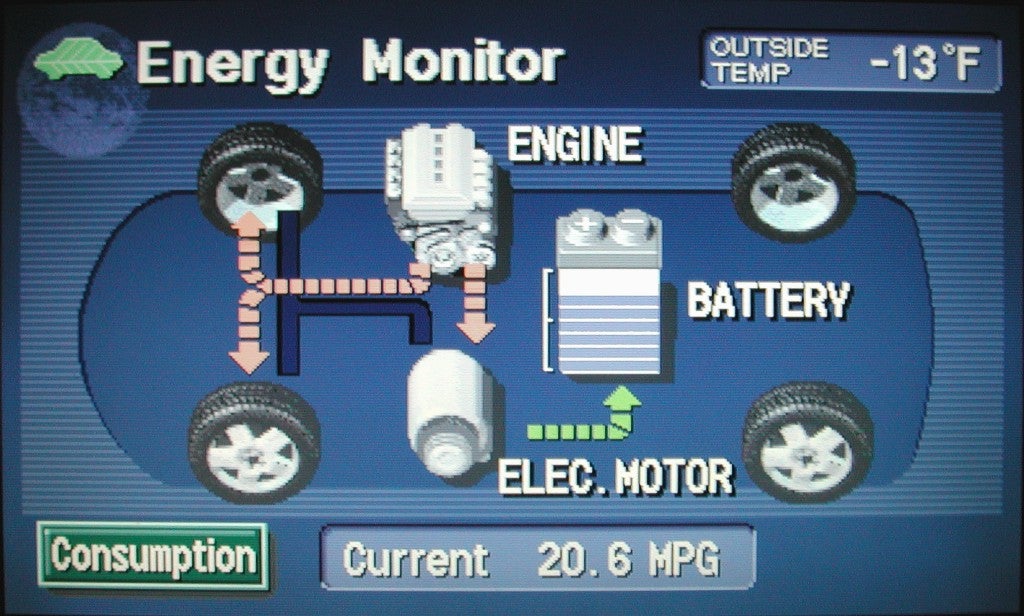 "CounterTorqueSteer" (countertorquesteer)
"CounterTorqueSteer" (countertorquesteer)
12/08/2014 at 09:21 • Filed to: hybrid, electric, prius, batteries, fp
 8
8
 21
21
 "CounterTorqueSteer" (countertorquesteer)
"CounterTorqueSteer" (countertorquesteer)
12/08/2014 at 09:21 • Filed to: hybrid, electric, prius, batteries, fp |  8 8
|  21 21 |

As the world continues to become more dependent on alternative energy sources for day to day activities, one trend that has become a staple in society is the use of hybrid and electric vehicles for personal transportation. These vehicles are said to be much better for the environment, for the simple reason that over their lifetime, they burn a significantly less amount of gasoline. While a traditional gasoline powered vehicle may be able to travel around thirty miles for every gallon of gasoline burned, a hybrid vehicle of the same size may be able to travel almost twice that (McManus). Even in the most advanced of all vehicles, top tier race cars, hybrid technology is being explored for the purpose of achieving maximum fuel efficiency and performance (Patriquin). At first glance, this technology may seem to be a simple, environmentally conscious solution to the issue of burning fossil fuels. As this trend continues to grow in popularity though, it begins to seem almost too good to be true. The issue that then arises, is whether or not hybrid and electric vehicles are really as environmentally beneficial as the general public is led to believe.
Even though hybrid and electric vehicles have been around for quite some time now, the question of environmental impact is becoming increasingly relevant due to the trends of sales. According to annual studies completed by Edmunds, one of America's leading online resources for automotive information, almost twice as many electric vehicles were sold to Americans in 2013 than were sold in 2012. A large contributor to that fact , besides availability, are the incentives that at least forty nine states and the District of Columbia are offering to owners of electric vehicles. Incentives include programs such as free parking, access to HOV lanes, and tax credits. Similar programs are offered to owners of hybrid vehicles as well (Hartman).
In order to fully understand the scope of the issue at hand, it is necessary to comprehend the basic concepts that differentiate traditional gas-powered vehicles from hybrids and electric vehicles. A traditional gas-powered vehicle is one in which power is generated solely from the burning of gasoline in an internal combustion engine to provide propulsion. An electric vehicle, or EV, on the other hand, is a vehicle in which electricity is stored in rechargeable batteries and then used to turn an electric motor that provides propulsion. A hybrid vehicle is one which contains both systems of an electric motor and an internal combustion engine. The two motors work in concordance. The gas motor works to provide propulsion while simultaneously charging the batteries for the electric motor. The electric motor fills the gaps in power of the gas motor (U.S. DOE).
A large portion of the public believes that just because a hybrid or electric vehicle uses less gasoline during its life on the road, it is better for the environment. This is not necessarily the case. Hybrids and electric vehicles are not as environmentally beneficial as the general public is led to believe. First, this is due to the fact that many electric vehicles depend on coal burning for their electricity. Additionally, this is due to the more energy that is required to manufacture hybrid and electric vehicles. Finally, this is due to heath concerns regarding cobalt used in the creation of energy dense lithium ion batteries.
Electric vehicles have a huge advantage over the traditional gas-powered vehicle and hybrid vehicles in the fight to reduce their carbon footprint: They do not burn a single drop of gasoline. Unfortunately, many advocates for the electric vehicle fail to look past that one advantage. The electricity that charges the batteries in EVs has to be produced. The U.S. derives close to 45 percent of its electricity from the burning of coal to turn massive turbines. In some of the nation's most populous states like Texas, Pennsylvania, and Ohio, that number is much closer to 100 percent (Braun). This burning of coal and emission of carbon into the atmosphere equates to approximately 62 billion dollars worth of environmental damage every year in the U.S. alone. All of this means that in order to generate the electricity to power the vehicles, a huge toll is taken on both the environmental and economic health of the world (Earth Talk).
In addition to the effect that electricity production has on the environment, hybrid and electric vehicles emit more greenhouse gasses during the manufacturing process. The production of hybrid batteries, in particular, requires much more energy than producing a standard car battery, and results in higher emission levels of gasses. After the materials that must be collected to manufacture a hybrid battery are mined, they are then transported on large cargo ships overseas to be turned into those batteries (Roos). Just like the electricity that will be stored, the batteries require massive amounts of energy to manufacture. This process puts the hybrid vehicle behind the traditional gas-powered vehicle as far as environmental harm at the moment of sale. In other words, when a hybrid vehicle is sold to a customer, it has already caused more harm to the environment than a non-hybrid.
Finally, the production of energy-dense lithium ion batteries for use in both hybrid and electric vehicles has been linked to pulmonary, neurological and respiratory issues. These concerns have been observed in both miners and factory workers. The link between the workers and the heath issues has been isolated to the exposure to cobalt (Thomas). Cobalt is a key ingredient in the manufacturing process of lithium batteries, and unless manufacturing and mining can be completely automated, these health concerns will continue to surface. The owners of hybrid and electric vehicles may never know the extent to which their vehicle contributed toward health issues of workers that helped to build their cars, but as it stands, the workers are truly sacrificing for the product.
Many proponents of hybrid and electric vehicles have said that these vehicles are more environmentally friendly while they are on the road, so overall, they are better for the environment (Wilson). While there is no question that vehicles that burn less gasoline are better for the environment while being used for transportation, the manufacturing process can not be overlooked. It takes on average 160,000 miles for a hybrid to make up for the harm that was done to the environment during the duration of production. That is, in order to "break even" environmentally, a hybrid owner would have to drive that car 160,000 miles. It is not likely that many hybrid owners will keep their cars past the 160,000 mile mark, and even if they do, there is no guarantee that the battery in the car will last that long. Hybrid manufacturers aren't sure of the battery lives either, as warranties for batteries range anywhere from 50,000 miles to 150,000 miles. When those batteries do need to be replaced, it could cost the owners upward of 3,000 dollars (Roos). At that point, many owners may decide that it would be better to just purchase a new car instead of going through the hassle of having a new battery installed in an old car. This would restart the cycle of environmental harm through production of more batteries.
Other proponents of electric vehicles focus on the efficiency of their motors compared to gas motors. As an operating automobile, gas cars have an efficiency of around 30 percent while electric cars are closer to 90 percent (Levinson). Unfortunately, those statistics fail to take in to account the inefficiency of creating the electricity that runs the motors, as was discussed earlier.
Ultimately, this is an issue that matters to society because it is an issue of consumer deception. If automakers are able to continue to market hybrid and electric vehicles as significantly better for the environment, then owners of those cars will be unknowingly causing unintended harm. In order to help resolve this issue, policies need to be put in place that would limit the marketing of hybrid and electric vehicles as a perfectly green solution to conventional gas automobiles. Before any of this is done though, more research needs to be collected on the average life of the batteries. With this information, consumers will be able to make more informed purchases and will have a better idea of their overall environmental impact. Hybrid and electric vehicles currently attempt to fill a niche that does not yet exist. Until the process in which electricity and batteries are produced becomes universally cleaner, the smarter, cheaper decision for the average consumer will continue to be the gas powered car.
____________________
References:
Braun, Peter. "Don't Look So Smug: Your Tesla Might Be Worse for the Environment than a Gas Car". Digital Trends, 14 November 2014. Web. 02 November 2014.
Earth Talk. "The Coal Truth: Will the Coming Generation of Electric Cars Just Be Coal-Burners, Once Removed?". Scientific American, 04 May 2010. Web. 02 November 2014.
Hartman, Kristy. "Leading the charge." State Legislatures 40.5 (2014): 11. Academic OneFile. Web. 12 Oct. 2014.
Levinson, David M. "Electric Avenue". Foreign Affairs 93.3 (2014): 21-26. Academic Search Complete . Web. 24 Sept. 2014.
McManus, Reed. "Rise Of The Plug-In Hybrids." Sierra 98.4 (2013): 50-55. Academic Search Complete. Web. 12 Oct. 2014.
Patriquin, Martin. "Running On Fumes". Maclean's 126.37 (2013): 44-46. Academic Search Complete . Web. 24 Sept. 2014.
Roos, Dave. "Does hybrid car production waste offset hybrid benefits?". HowStuffWorks, 06 December 2010. Science vs. Myth. Web. 03 November 2014.
Thomas, C.E. Sandy. "How green are electric vehicles?" International Journal of Hydrogen Energy 37.7 (2012): 6053+. Academic OneFile. Web. 13 Oct. 2014
U.S. Department of Energy. "How Hybrids Work". fuel !!!error: Indecipherable SUB-paragraph formatting!!! . Hybrid Vehicles. Web. 03 November 2014.
Wilson, Lindsay. "The 'Electric Cars Aren't Green' Myth Debunked". Shrink That Footprint, February, 2014. Web. 01 November 2014.
 ly2v8-Brian
> CounterTorqueSteer
ly2v8-Brian
> CounterTorqueSteer
12/08/2014 at 09:33 |
|
Well done.
 ADabOfOppo; Gone Plaid (Instructables Can Be Confusable)
> CounterTorqueSteer
ADabOfOppo; Gone Plaid (Instructables Can Be Confusable)
> CounterTorqueSteer
12/08/2014 at 09:36 |
|
Not green at all. That one is silver...
 EL_ULY
> CounterTorqueSteer
EL_ULY
> CounterTorqueSteer
12/08/2014 at 09:40 |
|
When I was a tech at Lexus/Toyota, a lot of the hybrids that came in were indeed high mileage after the 4 year mark. Texas cities are not centralized like most cities in Europe for example. I can honestly say that around 80% of the used inventory or more and the cars over that 4-5 year mark still being maintained by us were in that 100-150k mark. My shop had to replace the cells on only ONE hybrid car the 5 years I was a tech. And that was because a customer obstructed some venting ports while at the same time hit some debris on the road damaging a cooling line causing the batteries to over heat. As a dealer that had up to 150 cars coming in to service daily, that's a pretty good record of these battery's reliability even on early models. It's cool to see that some with 100k on the ticker still had the original brake pads because of its braking system. Also, we had to change the spark plugs on all cars at 120k but on the hybrid cars, the plugs didn't look as worn because the engine isn't on as often. The RX400h was especially cool because in 4x4, there was no mechanical propeller shaft going to the rear diff. Just 2 thick orange cables (seen below). Plus, Lexus used Lexus hybrid Drive over Toyota's Hybrid Synergy. Designed more for power than efficiency like the new T-8 Volvo XC90. The GS450h and LS600hL were very fast cars. With Toyota's presents in the FIA WEC and being the 2014 Champions, this just continues to tell me the technology will just keep improving.

 CounterTorqueSteer
> EL_ULY
CounterTorqueSteer
> EL_ULY
12/08/2014 at 09:45 |
|
Thanks for the information! It will always be very interesting to see how race bred technology trickles down.
 CounterTorqueSteer
> ly2v8-Brian
CounterTorqueSteer
> ly2v8-Brian
12/08/2014 at 09:46 |
|
Thank you sir.
 EL_ULY
> CounterTorqueSteer
EL_ULY
> CounterTorqueSteer
12/08/2014 at 09:48 |
|
agreed but the process of production is like you wrote something that drags the whole deal down almost to a point where isn't really worth the effort.
 Tina Corbett
> EL_ULY
Tina Corbett
> EL_ULY
12/08/2014 at 09:49 |
|
I'm glad to hear that, I've been thinking of a hybrid for a while as I live so close to work (less than 1 mile) that a hybrid that can be all electric would be perfect for me. But I was afraid of the 'replace the battery before you're ready to for a shit-ton of money' stigma.
 JR1
> CounterTorqueSteer
JR1
> CounterTorqueSteer
12/08/2014 at 09:57 |
|
I like your argument about burning coal. That seems to be something people tend to forget. Hopefully in the coming decade this issue can be less of an arguing point against electric cars. I would love to see a way for hybrids and full electric to fill up at a charging station powered by solar much like Tesla's charging stations. Quickly and efficiently.
 CounterTorqueSteer
> JR1
CounterTorqueSteer
> JR1
12/08/2014 at 09:59 |
|
Thank you. I took that angle because I rarely hear people make that argument. I completely agree that it would be great to see a surge in alternative methods of electricity production. Tesla is paving a good path.
 EL_ULY
> Tina Corbett
EL_ULY
> Tina Corbett
12/08/2014 at 10:01 |
|
a couple good friends of mine purchased an 05 and an 07 Prius both with around 80K on the ticker about 4 years ago. The still own them today. Living so close to work like that is pretty much the ideal situation for one. Still, like any car from Prius to Zonda, nothing is guaranteed and a very good look at the car (maint. records, test drive, etc.) is key :]
It takes me an hour to get to work and go home. If I lived a mile away from, i'd be so psyched i'll walk only using my bum! lol :]
 Wrong Wheel Drive (41%)
> CounterTorqueSteer
Wrong Wheel Drive (41%)
> CounterTorqueSteer
12/08/2014 at 10:05 |
|
Your points are all valid and I definitely will look at the sources for more info, good writeup! I wonder though what the actual environmental impact (numerically) is for both types of cars. I am just curious how that 160k mile mark was determined and if that is accurate. If that number was closer to 100k, I could see the technology being effective still. But like you said, more research needs to be done on battery longevity!
 CounterTorqueSteer
> Wrong Wheel Drive (41%)
CounterTorqueSteer
> Wrong Wheel Drive (41%)
12/08/2014 at 10:14 |
|
Thank you! There is a ton of data out there, and I would assume that the milage would differ from study to study. It really all depends on how an owner drives their own car.
 BaseTrim
> CounterTorqueSteer
BaseTrim
> CounterTorqueSteer
12/08/2014 at 10:24 |
|
The best news with all of this is that the P1, TheFerrari and 919 feel a lot more like old fashioned super cars in light of this info. Just tearing ass around the planet, trying to find new ways of destroying it. Just like in the old days.
 BaseTrim
> EL_ULY
BaseTrim
> EL_ULY
12/08/2014 at 10:24 |
|
I live in Texas too!
 Racescort666
> CounterTorqueSteer
Racescort666
> CounterTorqueSteer
12/08/2014 at 10:28 |
|
Interesting and extensivly researched. I've got something to add though about electricity production: stationary power generation is way more efficient than mobile can ever be. Mobile has to make sacrifices for weight and size while stationary doesn't and with additional regulation, could burn cleaner than a mobile unit. Also, some combined cycle hybrid power plants and in the 60% thermal efficiency range which is incredible. It is truly an infrastructure problem with the coal burning power plants rather than some other (almost literally any other) fuel source. Nuclear power is probably the most effective near-term solution, highly debatable though it may be, but it has it's own problems.
 deekster_caddy
> CounterTorqueSteer
deekster_caddy
> CounterTorqueSteer
12/08/2014 at 10:34 |
|
Hi! Well written article bringing up some excellent discussion topics. I have a couple of points:
1) Coal - Although a large percentage of electricity in the US is created by burning coal, there is also a large percentage that is not. As an electricity plant gains a new technology or finds a cleaner way to produce energy, the EV benefits immediately, whereas a fuel burning car has to wait until the next hardware refresh... i.e. most gas car owners won't replace their engine with a newer, cleaner engine just because it's available. So when a coal plant becomes cleaner, so does everything that uses it's output! Push the energy companies to produce cleaner electricity! Where I live less than 5% of our electricity comes from coal. Most utility companies offer a breakdown of your power source. Some offer a "green power" option where you pay a little extra for them to source more power from their cleanest sources.
2) Off-peak charging -Many EV owners charge during off-peak hours when electricity production is in abundance and often goes to waste.
3) Battery life - many EV battery packs have a life beyond the EV. GM has an arrangement with a third party energy company to use the 'used' battery packs from the Volt for a component in a generator system. Most of the materials in the batteries can be reused or recycled at the end of their useful life.
4) Efficiencies in transport - Yes, there are losses when 'transporting' electricity over wires. Many EV owners are installing solar to reduce that effect. Don't forget that refining oil into gasoline uses quite a bit of energy, and all of the diesel fuel being burned by the tanker trucks delivering that gasoline to the gas stations, and the gas and time wasted by going to the gas station. It's not like gasoline's energy losses start after it's already in your tank.
5) Battery Chemistry and production - yes, the places where lithium is being mined, and other rare chemicals are being gathered. What's the damage of that as compared to pumping millions of barrels of oil out of the ground? Not sure if it's worse... or better... but I didn't go into my EV blindly, either. I think it's important that people are aware of these things before buying an EV.
 EL_ULY
> BaseTrim
EL_ULY
> BaseTrim
12/08/2014 at 11:00 |
|
we all do, muah ha haaaa
 Tina Corbett
> EL_ULY
Tina Corbett
> EL_ULY
12/08/2014 at 11:13 |
|
I walk almost every day now as it takes me a whole 9 minutes to get to work by walking. But the grocery store is maybe a 15 minute walk which isn't that bad. But it's the bringing a whole week of grocery stuff back, or the days I need to go somewhere that an electric car would work for me. But, I have an apartment with no garage so I have no where to charge a pure electric one, so it would need to be a hybrid.
 EL_ULY
> Tina Corbett
EL_ULY
> Tina Corbett
12/08/2014 at 11:53 |
|
true true. Even so, any small car would be a good choice. A Prius for example will just you that bit more economy and a high tech infotainment display.


or.....

because loyalty to our jobs :]
 orcim
> CounterTorqueSteer
orcim
> CounterTorqueSteer
12/09/2014 at 04:21 |
|
I'm just waiting for that charging car to have owner intelligence ("I need this at full charge 8AM Tuesday morn") and to have the utility company make sure that's so, but in the meantime (since it's connected to the net) *use* it as a load leveler to make power generation more efficient.
Smart grid, I know. But damn, if these were popular *and* we could make use of them while they weren't being used, there'd be champaign available all the time. Power curve fitting is sooo important to efficiency.
 f-grimey
> CounterTorqueSteer
f-grimey
> CounterTorqueSteer
12/09/2014 at 13:34 |
|
Hybrids and electric cars are NOT worse for the environment than normal cars!!
Okay, now that I have your attention, I'd like to rebut your article.
Firstly, the environmental impact of manufacturing hybrids is only marginally greater than that of a non-hybrid. This is true whether you measure it in terms of CO2 equivalents in emissions (Aguirre et al, Burnham et al), energy use (Aguirre et al, Burnham et al), or ecosystem degradation, resource degradation, and harm to humans (Notter et al). On a lifecycle basis, hybrid cars incur 35% less emissions and use 35% less energy than conventional cars (Aguirre et al), in addition to incurring overall 45% less overall environmental impact measured in terms of the EcoIndicator 99 benchmark (Gerkens et al), which is a standardized measurement of environmental impact in terms of human health, ecosystem quality, and resource quality (Ministry of Housing, Spatial Planning and the Environment), with electric cars scoring similarly on the same benchmark (Notter et al). These lifecycle analysis findings already refute the core premise of your argument that hybrids and electric cars are worse for the environment than normal cars.
Secondly, you have massively overstated the environmental impact of battery manufacturing. The battery only accounts for 15% of an electric car's overall environmental impact, with resource extraction making up less than 2.3% (Notter et al). On a full lifecycle basis, the electric car is more environmentally friendly than conventional cars, with lower abiotic depletion potential, global warming potential, nonrenewable cumulated energy demand, and on the EcoIndicator 99 benchmark (ibid).
Thirdly, your quoted breakeven of 160,000 miles is uncited and unsupported, and in fact, directly contradicts your own source (Roos), who explicitly states that "environmental impacts of hybrid vehicle production [do not] outweigh the long-term benefits of driving a cleaner running automobile", citing Burnham et al . According to the numbers made available by Aguirre et al, the breakeven of a hybrid car for both energy use and emissions is 10,000 miles compared to a conventional car. Even if you were to assume sunk costs on the part of manufacturing the conventional car and set that to zero, that merely pushes the breakeven point out to 30,000 miles.
Fourthly, the pulmonary, neurological, and respiratory issues you have noted are only relevant if you break open the battery pack and eat the contents. If you render most anything into its base industrial format, you will find that it will probably harm or kill you with some type of exposure (eg inhalation, ingestion, contact). The reality is that batteries are produced in tightly controlled factory settings, and sealed against tampering. Ultimately, they are returned for recycling (O'Dell). None of it goes on to harm either people or the environment, short of malicious intent.
In all fairness, you're absolutely right that this is an issue that matters to society because it is an issue of consumer deception. Where your conclusion is incorrect is in which ideas are deceptive, and where that deception is coming from. The idea that the battery of hybrids and electric cars make them worse for the environment originally came from an article written by the Daily Mail, which claimed that Prius battery production had devastated Sudbury through its nickel mine (Delgado). This article was later retracted when it was pointed out that the environmental damage being attributed to the Prius was both inflicted, and corrected, decades before the Prius even existed (Rado). The only point in Delgado's article that went unchallenged by Rado's retraction was the environmental impact of shipping. Aguirre et al's work establishes that shipping does not play a significant role in the environmental impact of a car, with shipping efficiencies of 1,000 miles per gallon per ton rendering energy and emissions incurred in shipping negligible.
Complementing this article was CNW Marketing's "Dust to Dust" article (Spinella), which infamously claimed the Prius is worse for the environment than a Hummer. This article has since been categorically refuted for its blatantly biased inputs, assumptions contradicting the literature, and nonsensical conclusions (Gleick).
These two were rolled into a unified article written by Chris DeMorro, which combined the arguments from Delgado and Spinella to argue the Prius is worse for the environment than normal cars. DeMorro's article, though derivative, was ultimately the one that went viral. While Delgado and Spinella's work were discredited in the following months, Jeremy Clarkson published his episode of Top Gear (Clarkson), which was in turn a synthesis of DeMorro's work (note Clarkson's verbatim usage of the claims from DeMorro's work), even though the underlying sources had already been utterly discredited. As you can see, the deception is, in fact, coming from the anti-hybrid and electric car crowd, not their manufacturers nor their proponents.
The literature shows that hybrids and electric cars are, in fact, significantly better for the environment than normal cars across their full lifecycles, a conclusion supported by virtually every lifecycle analysis conducted on the matter. By purchasing a hybrid or an electric car, you can make up for the environmental impact of its manufacture very quickly, meaning that the environmentally friendly choice is to scrap an existing inefficient car, and replace it with a more efficient one.
!!! UNKNOWN CONTENT TYPE !!!
References:
Aguirre, Kimberly, Luke Eisenhardt, Christian Lim, Brittany Nelson, Alex Norring, Peter Slowik, and Nancy Tu. "Lifecycle Analysis Comparison of a Battery Electric Vehicle and a Conventional Gasoline Vehicle." Ed. Deepak Rajagopal. (2012). UCLA Institute of the Environment and Sustainability. Web. 9 Dec. 2014. < http://www.environment.ucla.edu/media/files/Ba…
Burnham, A.; Wang, W.; Wu, Y. Energy Systems Division, Argonne National Laboratory. "Development and Application of GREET 2.7 - The Transportation Vehicle Cycle Model." November 2006. http://www.transportation.anl.gov/pdfs/TA/378.PD…
Clarkson, Jeremy. Top Gear. BBC. "The One Gallon Fuel Crisis Race." 22 June 2008. Television. 9 Dec. 2014. < https://www.youtube.com/watch?v=JmxUsG… >.
Delgado, Martin. "Toyota Factory Turns Landscape to Arid Wilderness." The Daily Mail 18 November 2006. Web. 9 Dec. 2014. < http://priuschat.com/threads/toyota…
DeMorro, Chris. The Recorder. "Prius outdoes Hummer in Environmental Damage". 7 March 2007. 9 Dec. 2014. < http://www.freerepublic.com/focus/news/190…
Gerkens, B., Ph. Teller, S. Lassaux and A. Germain. University of Liège. "Comparison of two models of environmental valuation - Application to a particular case study (alternative vehicles)". 9 Dec 2014. < http://www2.ulg.ac.be/cior-fsa/publi…
Gleick, Peter H. Pacific Institute. "Hummer versus Prius "Dust to Dust" Report Misleads the Media and Public with Bad Science". May 2007. 9 Dec 2014. < http://www.pacinst.org/wp-content/upl…
Ministry of Housing, Spatial Planning and the Environment. Eco-Indicator 99 Manual for Designers. (2000, October 1). 9 Dec 2014. < http://www.pre-sustainability.com/download/manua… >.
Notter, Dominic A., Marcel Gauch, Rolf Widmer, Patrick Wäger, Anna Stamp, Rainer Zah, and Hans-Jörg Althaus. "Contribution of Li-Ion Batteries to the Environmental Impact of Electric Vehicles." Environmental Science & Technology 44.17 (2010): 6550-556. ACS Publications. Web. 9 Dec. 2014. < http://pubs.acs.org/doi/full/10.10…
O'Dell, John. "What Happens to EV and Hybrid Batteries?" Edmunds. 25 Aug. 2014. 9 Dec 2014. < http://www.edmunds.com/fuel-economy/w… >
Rado, Dave. "Toyota factory". The Daily Mail 9 May 2007. 9 Dec. 2014. < http://www.dailymail.co.uk/news/article-4…
Spinella, Art. "Dust to Dust: The Energy Cost of New Vehicles from Concept to Disposal". CNW Marketing. April 2006.